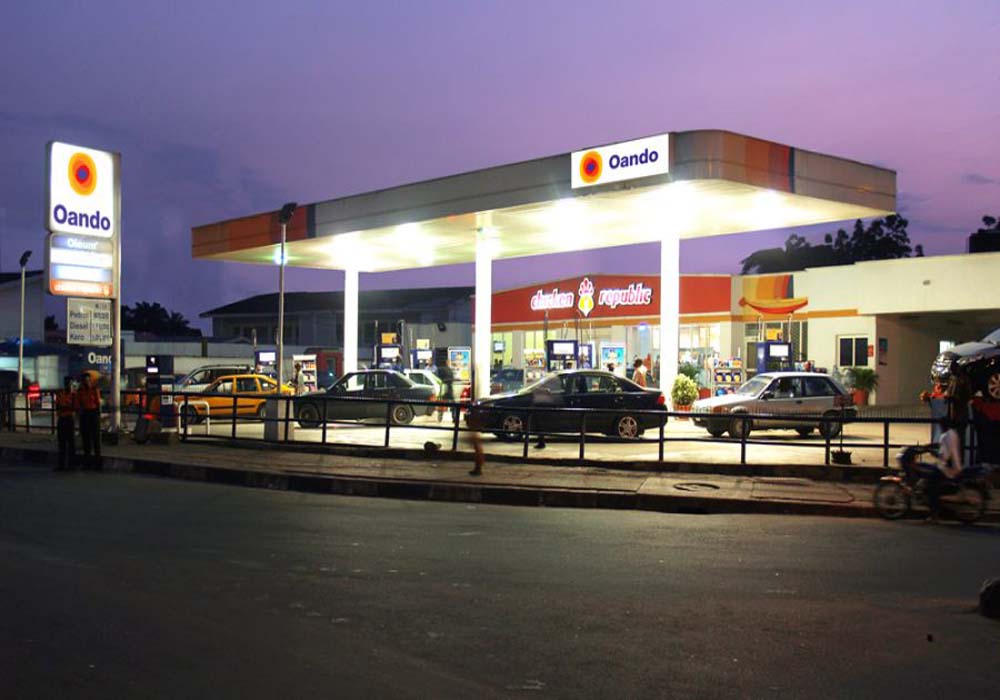Energy
Oando opens ultra-modern petrol station in Lagos

LAGOS-OANDO Marketing Limited, a subsidiary of Oando PLC has commissioned a new retail station at KM3, Orile, on the Lagos – Badagry expressway. The quality of the upgraded service station is consistent with the company’s commitment to lead in the area of fuel retailing in Nigeria, especially as they already lead the pack in most other areas of the energy value chain.
With a current fuel distribution capacity of over 2bn liters annually, Oando has retained its leading market share for fuel retailing and is poised to continue to expand leveraging its strong brand affinity, efficient distribution capacity, and entrepreneurial heritage.
Oando KM3, Orile Lagos as the station is called boasts of modern, contemporary, and eye-pleasing design with detailing infused to specifically meet the needs of customers and travelers on the Lagos-Badagry expressway axis. The station upgrade was timely executed to complement the new 10-lane super highway which is billed for completion in less than 24 months, specifically, the station is situated very close to one of the passenger train stations on the new highway.
Equipped to service over 2000 cars per day, the station’s arsenal of silent, ultra-fast premium fuel dispensing units has been specially configured to deliver accurate quantities at all times to ensure consumers receive value for money at every visit to the retail outlet. In addition to liquid fuels, Oando KM3 Orile will also retail Oando’s full basket of petroleum products including car maintenance services via its advanced auto-care center, which was also commissioned for immediate use by customers. Altogether KM3 Orile will deliver the most premium service to customers in the Ijora, Orile & Iganmu axis.
Speaking at the launch, the CEO of Oando Marketing Limited, Mr. Abayomi Awobokun expressed satisfaction with the quality of the station upgrade, its visual contribution to the neighborhood, the environmental considerations in its design, and most important the value it would bring to customers and travelers on the Lagos-Badagry super highway when it’s completed. In his remarks, he acknowledged the hospitality of the host community, led by the Ojora of Ijora, HRM Oba Abdulfatai Oyeyinka Aremu Aromire, ably represented at the station launch by a distinguished bench of high chiefs and nobles. Furthermore, he commented on the positive outcomes from the efforts of the State government as the entire area was already showing signs of increased commercial activities as a result of the huge investments in infrastructure in the area.
Speaking on the downstream Oil & Gas sector, Awobokun noted that “despite industry challenges, Oando Marketing Ltd is still able to compete favorably amongst its peers evidenced not only by its market share and current station footprint but also by its ability to continue upgrading and growing its network right across the country”.
Oando Marketing is also leading in the area of the development of blue collar workers, having so far trained over 1000 auto-mechanics via its Oleum Academy which commenced in 2014 to boost the competencies of mechanics all over Nigeria. In addition to class room and on-the-job training, the company also provides car diagnostic tools to graduating mechanics to boost their ability not only to ply their trade but to do so in a sustainable manner.
Similarly, Oando Marketing Ltd is the leading retailer of LPG in Nigeria, successfully distributing the product in every state of the country. In addition to the sales of LPG, it launched an LPG awareness campaign for teenagers” called “Teens Can Cook” in 2014, to educate and encourage the use of LPG for domestic use in schools, hospitals, restaurants and homes across the country. “The Teens Can Cook” initiative has successfully carried out cooking campaigns involving over 70 schools and at 10 NYSC camps across the country including Rivers & Kogi States. Oando intends to switch 5m homes to LPG for domestic use over a 5 year period from dirty fuels like coal and firewood.
The company recently announced the recapitalization of its downstream business through a joint venture arrangement consisting of renowned international firms with experience and proven track record in raising the standards in technology and the Oil and gas downstream sectors. Oando Marketing boasts of businesses and operations in key West African countries including Ghana and Togo.
Led by energetic and dynamic leadership and guided by international processes in operational standards and service offerings, Oando Marketing is poised to enhance its leadership as Nigeria’s premier downstream company and ultimately revolutionize the way the business is run on the African continent.
Energy
Nigeria’s Gas Output Increases By 2.9%, Reaching 2.29 MSCF

Amid a slight increase in gas production, Nigeria’s oil output experienced a substantial rise in November 2024.
Gas production saw a 2.9% month-on-month (MoM) increase, reaching 2,292,951 million standard cubic feet (MSCF) from 2,292,471 MSCF in October.
However, on a year-on-year (YoY) basis, the growth was minimal, with a mere 0.02% increase in output for the first 11 months of 2024, compared to the same period in 2023.
READ MORE: Tinubu Mourns Ex-U.S. President Jimmy Carter, Celebrates His Legacy
The latest gas report from the Nigerian Upstream Petroleum Regulatory Commission (NUPRC) also revealed a 1.6% increase in domestic gas consumption.
A total of 606,658 MSCF was consumed locally, compared to 596,861 MSCF during the same period in 2023. Gas exports, meanwhile, rose by 6.9%, reaching 829,156 MSCF, up from 775,547 MSCF in the corresponding period of 2023.
This growth in exports continues to play a vital role in bolstering Nigeria’s foreign exchange earnings.
Despite these positive figures, sources close to the Ministry of Petroleum Resources (Gas) noted that oil remains the dominant force in Nigeria’s energy sector, with gas taking a secondary role.
On the other hand, the NUPRC’s oil production report revealed a remarkable surge.
Nigeria’s oil output, including condensates, rose by 13.3% year-on-year in November 2024, reaching 1.7 million barrels per day (bpd), up from 1.5 million bpd in November 2023. Month-on-month, oil production also increased by 10%, from 1.5 million bpd in October 2024.
Dr. Muda Yusuf, CEO of the Centre for the Promotion of Private Enterprises (CPPE), discussed the broader structural dynamics within Nigeria’s economy, highlighting the dominance of the non-oil sector.
In his 2025 Outlook, Dr. Yusuf noted that the non-oil sector contributed 94.43% to Nigeria’s GDP in Q3 2024, while the oil sector accounted for just 5.57%.
“However, the economy is characterized by a paradox of the oil sector contributing an estimated 90% of foreign exchange earnings, while the non-oil sector accounts for about 10%,” Dr. Yusuf said.
“This is a structural shortcoming in our economy which needs to be addressed, as sectors that contribute hugely to GDP have no corresponding contribution to foreign exchange earnings.”
He further emphasized the need to address the challenges faced by the non-oil sector, which include issues related to productivity, infrastructure, funding, and regulatory constraints.
“The policy implication is that more should be done to fix the challenges of productivity and competitiveness of the non-oil sector of the economy,” Dr. Yusuf added
Energy
JUST IN: NNPC Ltd Reopens Warri Refinery

The Nigerian National Petroleum Company Limited (NNPC Ltd) has announced that the 125,000-barrel-per-day Warri Refining & Petrochemicals Company (WRPC) in Warri, Delta State, has become operational.
This is coming about a month after the commencement of operations at the 60,000-barrel-per-day-old Port Harcourt Refinery.
The Group Chief Executive Officer, NNPC Ltd, Mele Kyari, made the disclosure during a tour of the facility on Monday.
ALSO READ: SERAP Urges Tinubu To Direct CCB To Publish President’s, VP’s, Others Assets
A video posted by Channels TV on Monday showed Kyari addressing a tour team, which included the Chief Executive Officer of the Nigerian Midstream and Downstream Petroleum Regulatory Authority (NMDPRA), Farouk Ahmed.
Before the tour commenced, Kyari explained that the inspection aimed to show Nigerians the level of work completed so far.
According to him, although the repairs on the facility are not yet 100 per cent complete, operations have commenced.
He said, “We are taking you through our plant. This plant is running. Although it is not 100 per cent complete, we are still in the process. Many people think these things are not real. They think real things are not possible in this country. We want you to see that this is real.”
Located in Ekpan, Uwvie, and Ubeji, Warri, the petrochemical plant produces 13,000 metric tonnes per annum (MTA) of polypropylene and 18,000 MTA of carbon black.
Commissioned in 1978 and managed by NNPC Ltd, the WRPC was built to supply markets in the southern and southwestern regions of Nigeria.
The mechanical completion of the facility was initially scheduled for the first quarter of 2024, according to the Spokesperson of the NNPC Ltd, Olufemi Soneye.
“Warri should be done by Q1 (first quarter) 2024,” Soneye stated.
The WRPC is one of Nigeria’s four refineries. Others include the old and new Port Harcourt Refining Company in Rivers State and the Kaduna Refining and Petrochemical Company in Kaduna State.
Energy
Dangote Partnership: MRS Urges Nigerians To Insist On N935/Litre Petrol Price Nationwide

MRS Oil Nigeria Plc, a prominent player in the Nigerian downstream oil industry, has implemented a new petrol price of N935 per litre across all its retail service stations nationwide.
The company has also called on Nigerians to monitor and report any outlets that fail to adhere to the new price structure.
Biztellers reports that this is consequent upon an announcement by the President of Dangote Industries Limited, Aliko Dangote, that the Dangote Petroleum Refinery has partnered with MRS Oil and Gas to offer petrol at N935 per litre at retail outlets, following a reduction in the ex-depot price from N970 to N899.50 per litre.
ALSO READ: Dangote Slashes PMS Price To N899.50k
It was gathered that MRS Oil Nigeria Plc has instructed all its outlets to implement the new price immediately, setting up a digital platform and monitoring team to ensure full compliance.
In a statement on Monday night, the company declared, “Petrol is now being sold at N935 at MRS Filling Stations nationwide. If you find any station not following this price, please report it. Call 08009447853 or email: NG-FMKPMGWHISTLEBLOWING@NG.KPMG.COM”
Emphasising the eco-friendly nature of its products, MRS Oil added, “We call on all petrol station owners to join MRS Oil Nigeria Plc in improving the supply chain of our beloved country, ensuring product quality and availability in every corner of Nigeria for the benefit of all Nigerians.”
In Lagos, commuters were seen queuing at MRS filling stations to purchase petrol, with many expressing their gratitude to the Dangote Petroleum Refinery and MRS Oil and Gas, urging other marketers to support the indigenous refinery rather than import off-spec products into the country.
A commuter at the MRS station at Alapere on the Lagos Ibadan Express way, Ibukun Phillips, could not hide her joy as her husband filled up their car.
“I am very happy today. This is a victory for Nigeria,” she said. “The price reduction is the best gift of the season. But beyond just the reduction, we are buying standard, eco-friendly petrol at a lower rate. My husband and I have decided we will only be using MRS from now on because we are confident in the quality of the product and supporting the economy.”
A commercial bus driver, Adio Ajibade described the price reduction as a great relief, especially during the festive season.
“The reduction is a great relief. It will reduce transportation costs and benefit Nigerians. God will continue to bless Alhaji Aliko Dangote,” he said.
A public affairs analyst and university lecturer, Dr. Tunde Akanni, said the collaboration between Dangote Petroleum Refinery and MRS Oil represents a significant step towards improving the affordability, quality, and sustainability of petroleum products in Nigeria.
According to Dr. Akanni, “this move will not only help ease the financial burden on Nigerians but also promote a more environmentally conscious approach to fuel consumption, benefitting both the economy and public health in the long term.”















